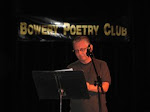About This Project 
While on a trip to Paris in 2003, I discovered the little book above in the bookstore of the Musée d'art Naïf. One hundred short poems by Ernst Herbeck, a writer I had never heard of, in German and French. Having studied German a bit in college, and mistakenly believing the language used to be reasonably simple, I bought the book, hoping to brush up on my German, and hopefully learn a bit of French in the process.
Five years later, I now have several more books by Ernst Herbeck, including one posthumous collection,
Im Herbst da reiht der Feenwind, (
In Autumn the Wind of Fairies Aligns) which collects together some 400 of the poet's approximately 1,200 poems.
Ernst Herbeck was born in 1920 in Stockerau, Austria. He was operated on numerous times for a congenital hair-lip, which made speaking difficult for him for much of his life. While working in a munitions factory in 1940, he began to report the feeling of animals or other people invading his body. He was briefly institutionalized, released, and served for about five months in the military. He was hospitalized again in 1945, and spent the rest of his life in mental institutions.
About the poemsIn 1960, the psychologist and writer Leo Navratil (1921-2006) met with Herbeck and, providing him with a blank postcard and a pen, asked him to write a poem on the subject of "morning." After thinking for a while, Herbeck wrote the following poem:
Der Morgen.
Im Herbst da reiht der
Feenwind
da sich im Schnee die
Mähnen treffen.
Amseln pfeifen heer
im Wind und fressen.Navratil was struck by the results and continued this process, providing pen, paper, and subject for Herbeck during many of their meetings until Herbeck's death on September 11, 1991.
About the translation process
Given the way these poems had been written, not to mention my rather spotty German, I decided, rather than attempting super-accurate translations (never possible under the best circumstances), that I'd translate the process, to some extent. Taking the complete German-language original as my "prompt," I attempted to translate what I could, as quickly as I could, and then to fill in what remained somewhat associatively.
After translating about 100-150 of Herbeck's poems this way (the first few of which were published in an issue of the online journal
Fascicle), I began meeting with Oya Ataman, a Turkish-born woman who was then living in Munich. Over the course of a year or so, from about 2006-07, we went over many of the poems I had translated, and collaboratively translated dozens of others as well, this time trying to capture more of the mood, meaning, and word-play going on in the originals.
Since then, I've continued to translate his work, and am now beginning to put the poems back in order, to see what there is. The poems appear in Im Herbst da reiht der Feenwind more or less chronologically. Most are dated; I've supplied the dates where they exist, in the American fashion (e.g., 10/23/63 for October 23, 1963, which would have appeared as 23. 10. 63 in Herbeck's original hand).
More about this projectI'd like to use this blog to continue the translation and editing process. Using
Im Herbst da reiht der Feenwind as my guide, I'll post a new poem every day or so, in German and English translation, with any relevant notes. I'll also post the publisher's and editor's introductory material as well, in both the original German and English translation.
All feedback is encouraged. Feel free to post comments, or
e-mail me, especially if you see anything that looks completely off, and which doesn't seem to make legitimate "creative" sense. If you want to try your hand at translating any of these, please feel free. A menu box on the right links to the poems that have yet to be translated.
I plan to publish a collection of some of this work in book form at some point in the not-too-distant future, so if you would like acknowledgment, or would like to have any of your own translations considered for inclusion, definitely leave your full name and, ideally, some way to reach you, if you leave comments rather than e-mail.
For more about Herbeck in English, see
this,
this, and
this.
